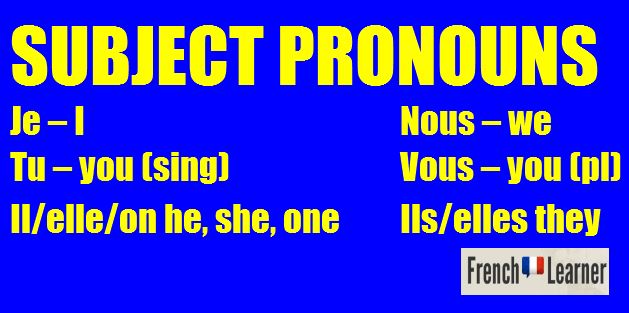What are the subject pronouns in French?
In French the subject pronouns are: je (I), tu (you singular informal), il, elle, on (he, she, one) nous (we), vous (you formal and plural) and ils, elles (they). These are also called personal pronouns. A subject pronoun is the person who carries out an action on a verb.

When formulating sentences, a subject pronoun often starts the sentence. For example, in the sentence, “Je vais à la plage”, the word “je” (I) is the subject (or personal) pronoun.

French personal pronouns explained
Now let’s learn about the subject pronouns individually and look at some example sentences.
1. Je (I)
Je simply means I. In grammatical terms je is called the “first-person singular.” When je is the first word of a sentence it needs to be capitalized. However, unlike English, when je appears in the middle of a sentence it doesn’t need to be capitalized.
For example:
- Je parle français. I speak French.
- Il ne sait pas quand j’arrive. He doesn’t know when I’m arriving.
2. Tu (you singular and informal)
Tu is you singular and informal. In grammatical terms, tu is called the “second-person singular.” This means you use tu when addressing one single individual and not two or more.
Familiar (informal) means that you use tu with and individual who you know and are comfortable being around or a child. Do not use tu with people you’ve just met or strangers.
For example:
- Est-ce que tu aimes Paris? Do you like Paris?
- Tu viens d’où? Where are you from?

3. Il/elle/on (he, she, one)
Il means he, elle means she and on can me “one” or we. This line is called the “third-person singular.” Here are some examples of il and elle.
- C’est Marie. Elle est intelligente. It’s Marie. She’s intelligent.
- C’est Martin. Il est professeur. It’s Martin. He’s a teacher.
Unlike English, tangible objects can be referred to with il and elle.
- C’est un vélo. Il est bleu. It’s a bike. It’s blue.
- C’est une pizza. Elle est chaude. It’s a pizza. It’s hot.
This page covers the subjec tof c’est vs. il est in detail.
The pronoun “on” means one or we. Here are a few quick examples.
- On mange à 17h00? Shall we eat at 5pm?
- On va chez toi? Shall we go to your place?
- En France on parle français. French is spoken in France.
Understanding how to use “on” can be a challenge for many students. This page covers subject pronoun on in detail.
4. Nous (we)
The subject pronoun nous means we and there’s not much to explain. Grammatically, nous is called the “first-person plural”.
For example:
- Nous commençons le repas à 18h00 ce soir. We’re starting the meal at 6pm tonight.
- Nous savons où nous sommes. We know where we are.
5. Vous (you formal and plural)
The French use vous to address both strangers and people they’ve just met in the singular “you” form. Vous is also used to address a group of people (you plural), regardless of age.
For example:
- Pourriez-vous m’aider? Can you help me?
- Est-ce que vous comprennez? Do you understand?
- Bonjour madame, comment allez-vous? Hello, ma’am. How are you?

Understanding when to use tu and vous can also be challenging for students. This page covers you in French (tu vs. vous) in detail.
6. Ils, elles (they)
Ils and elles both mean they. These are referred to as the “third-person plural”. Ils is used to refer to a group of males only or a group of males and females. Elles refers to a group of women only. If there are 99 women and one single man, use ils.
For example:
- Je connais Marie et Pierre mais je ne sais pas où ils habitent. I know Marie and Pierre but I don’t know where they live.
- J’adore l’équipe feminine de rugby. Elles vont gagner! I love the women’s rugby team. They’re going to win!
Summary Table — French personal pronouns
| Je I | Nous we |
| Tu you (singular familiar) | Vous you (singular formal and plural) |
| Il, elle, on he, she, one | Ils, elles they (masculine only or mixed, they female only |
Discover more:
- Guide to French verbs
- French stressed pronouns
- Guide to French numbers
- Most common French phrases
- Most common French expressions



